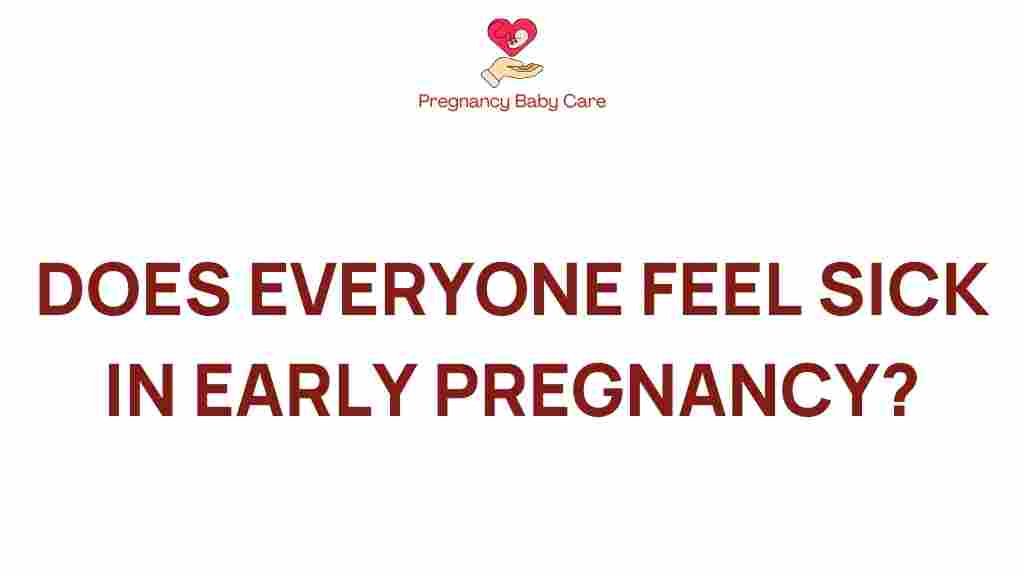Unraveling the Mystery: Does Everyone Experience Nausea in Early Pregnancy?
Early pregnancy can be a whirlwind of emotions and physical changes for expectant mothers. Among these changes, nausea, often referred to as morning sickness, is one of the most common symptoms. However, not every woman experiences this discomfort. In this article, we will delve into the nuances of nausea in early pregnancy, exploring why it occurs, who it affects, and what can be done to manage it. By the end, you will have a clearer understanding of this phenomenon and how it relates to overall health and wellness during pregnancy.
Understanding Early Pregnancy and Nausea
Early pregnancy typically refers to the first trimester, which lasts from week 1 to week 12. It is during this time that many women report experiencing nausea, which can be mild or severe. The symptoms of nausea can range from a slight queasiness to intense vomiting. Understanding why this occurs is essential for expectant mothers.
What Causes Nausea in Early Pregnancy?
Nausea in early pregnancy is primarily attributed to hormonal changes. When a woman becomes pregnant, her body undergoes significant hormonal shifts, particularly an increase in human chorionic gonadotropin (hCG) and estrogen levels. These hormonal fluctuations can affect the gastrointestinal system, leading to the sensation of nausea.
- Hormonal Changes: The surge in hCG is often linked to morning sickness, particularly in the early stages of pregnancy.
- Heightened Sensitivity: Many women find that their sense of smell becomes heightened, making them more sensitive to certain odors that can trigger nausea.
- Gastrointestinal Changes: Progesterone relaxes the muscles in the digestive tract, which may contribute to nausea and other digestive issues.
How Common is Nausea in Early Pregnancy?
Nausea is a prevalent experience among expectant mothers. Research indicates that:
- Approximately 50-80% of pregnant women report experiencing nausea at some point during their first trimester.
- About half of these women will also experience vomiting, a condition referred to as hyperemesis gravidarum in severe cases.
While nausea is common, it’s important to recognize that not all women will have this experience. Some may go through their entire pregnancy without feeling nauseous at all.
Common Experiences of Nausea in Early Pregnancy
For many women, nausea can manifest in various ways. Here are some common experiences:
- Morning Nausea: Contrary to its name, morning sickness can occur at any time of the day.
- Food Aversions: Many women develop aversions to certain foods or smells that they previously enjoyed.
- Fatigue: Nausea is often accompanied by extreme fatigue, which can amplify feelings of discomfort.
When Does Nausea Typically Start and End?
Nausea in early pregnancy usually begins around the sixth week of gestation and can last until the end of the first trimester. However, for some women, it may persist longer, even into the second trimester. Understanding this timeline can help expectant mothers prepare and seek support when needed.
Managing Nausea in Early Pregnancy
While nausea is a common symptom, it doesn’t have to be debilitating. Here are some tips for managing nausea during early pregnancy:
1. Dietary Adjustments
What you eat can significantly affect your nausea levels. Consider the following dietary tips:
- Eat small, frequent meals instead of large ones to keep your stomach from becoming empty.
- Opt for bland foods like crackers, toast, or rice, which are less likely to trigger nausea.
- Stay hydrated by sipping water or ginger tea throughout the day.
2. Lifestyle Changes
Incorporating certain lifestyle changes can also help alleviate nausea:
- Get plenty of rest to combat fatigue, which can worsen nausea.
- Avoid triggers such as strong smells or foods that make you feel sick.
- Consider using acupressure wristbands designed to relieve nausea.
3. Medical Interventions
If nausea becomes severe, it may be necessary to consult with a healthcare provider. They may recommend:
- Vitamin B6 supplements, which have been shown to help reduce nausea.
- Prescription medications for more severe cases, especially those diagnosed with hyperemesis gravidarum.
4. Support Systems
Having a support system can make a significant difference in managing nausea:
- Connect with fellow expectant mothers who can share experiences and coping strategies.
- Consider joining a local or online pregnancy support group.
Troubleshooting: When to Seek Help
While nausea is common, there are instances when it may require medical attention. Seek help if you experience:
- Severe vomiting that prevents you from keeping food or fluids down.
- Signs of dehydration, such as dizziness or infrequent urination.
- Weight loss that concerns you or your healthcare provider.
Remember, every pregnancy is unique. What works for one expectant mother may not work for another. It’s important to find strategies that suit your individual needs.
Conclusion
Nausea during early pregnancy is a common experience for many expectant mothers, but it is not universal. Understanding the causes, symptoms, and management options can empower women to navigate this challenging yet exciting time in their lives. If nausea becomes overwhelming, it’s crucial to reach out to healthcare professionals for guidance and support.
By prioritizing wellness and seeking help when needed, expectant mothers can better enjoy their journey through pregnancy. Whether you are experiencing nausea or not, remember that connecting with others and sharing experiences can also contribute greatly to your overall pregnancy wellness.
For more information on pregnancy wellness, check out this resource.
If you’re looking for support during your pregnancy journey, consider visiting this site for advice and community engagement.
This article is in the category Pregnancy and created by PregnancyBabyCare Team
